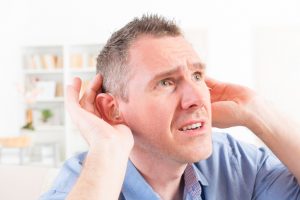 Presbycusis is the medical term for hearing loss experienced by people as they age. Hearing loss in the elderly often comes on gradually, over the course of several years. In the majority of cases, high-pitched sounds are affected the most. For example, one may find it difficult to hear birds chirping. Presbycusis can be mild in the beginning, so the person often isn’t even aware that they have age-related hearing loss. It is often a friend or a family member who notices that the TV volume is turned up too loud or that they have to keep repeating themselves to be heard.
Presbycusis is the medical term for hearing loss experienced by people as they age. Hearing loss in the elderly often comes on gradually, over the course of several years. In the majority of cases, high-pitched sounds are affected the most. For example, one may find it difficult to hear birds chirping. Presbycusis can be mild in the beginning, so the person often isn’t even aware that they have age-related hearing loss. It is often a friend or a family member who notices that the TV volume is turned up too loud or that they have to keep repeating themselves to be heard.
Presbycusis, or age-related hearing loss, is often brought on by the changes that take place in the inner ear as we get older. It can also occur due to the changes in the middle ear or along the nerve pathways between the ear and the brain. Sometimes medical conditions or even medications can impact hearing.
Advertisement
There are six main types of presbycusis:
Sensory: This refers to the loss of the outer hair cells in the Corti (part of the cochlea that responds to sound vibrations by making nerve impulses). This type of presbycusis applies to high-frequency sounds, so the ability to understand speech generally remains intact. Sensory presbycusis is slow to progress and begins at mid-life.
Neural: This is atrophy of the nerve cells in the cochlea and auditory pathways to the brain. Neural presbycusis is defined as the loss of over 50 percent of cochlear neurons. This type of hearing loss is more noticeable in older age, characterized by severely impaired ability to understand speech.
Metabolic (stria): This is atrophy of the stria vascularis, which provides blood supply to the inner ear and maintains the chemical and bioelectric balance in the cochlea. This type of presbycusis normally takes place during the last few decades of life and is progressing slowly.
Mechanical (cochlear conductive): This is a degenerative thickening and stiffening of the basilar membrane of the cochlea. Ability to hear speech is comparable to one’s level of hearing loss.
Mixed: Refers to a combination of different types of age-related hearing loss.
Indeterminate: None of the listed characteristics are present (about 25 percent of cases).
Presbycusis treatment options
Medical treatments are available for age-related hearing loss, along with lifestyle changes that can help improve your hearing. A hearing aid or cochlear implant can work to improve hearing.
You can also protect and even boost your hearing by avoiding excessive noise during leisure time, wearing special ear protection if you work in a noisy factory, and adhering to a healthy lifestyle, which includes regular exercise, a wholesome diet, and not smoking.
Health issues such as high blood pressure, cholesterol, and diabetes are not just standalone conditions, they can wreak havoc on other aspects of your health as well – hearing included. To prevent the loss of hearing due to a chronic health condition, you should properly manage the condition. For example, lower your blood pressure, manage cholesterol, and ensure your diabetes is under control.
Sometimes our hearing may become fuzzy or we feel like we can’t hear ourselves. These situations have more to do with earwax buildup than anything else. Earwax is often overlooked as the cause of hearing problems, but it’s a large factor. In fact, if earwax isn’t removed and maintained properly, it can lead to more serious types of hearing loss, such as conductive hearing loss.
We are not suggesting you stick a cotton swab or your car keys into your ear as earwax goes through its own removal process. If you do have wax buildup, you can see a doctor to have it removed, or pour a teaspoon of olive oil into your ear for a couple of nights to loosen it up, so it will come out on its own.
Advertisement
Allergies don’t just contribute to a runny nose and itchy eyes, they, too, can cause hearing loss. Allergies can cause serous otitis media – conductive hearing loss – which can make hearing quite difficult. All the congestion you feel can also work to block your ears due to swelling.
Over-the-counter allergy medication, or prescription if severe, should be able to relieve your allergy symptoms and improve your hearing.
If you’re concerned about your hearing, you should speak to your doctor. The longer you go without having your hearing checked or even treating it, the higher the risk of complications such as mental decline and even death.
